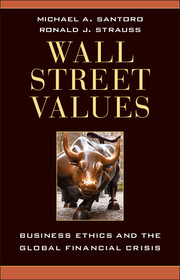Book contents
- Frontmatter
- Contents
- Preface
- Acknowledgments
- Part One Background and Theoretical Framework
- Chapter One A Financial, Governmental, and Moral Crisis
- Chapter Two Does Wall Street Have Any Responsibility to Society?
- Part Two Wall Street Business Model, Regulation, and Values in Transition
- Part Three Policy Recommendations and Sustainable Values for Wall Street in the Twenty-First Century
- Notes
- Index
Chapter Two - Does Wall Street Have Any Responsibility to Society?
Wall Street and Economic Prosperity
from Part One - Background and Theoretical Framework
Published online by Cambridge University Press: 05 February 2013
- Frontmatter
- Contents
- Preface
- Acknowledgments
- Part One Background and Theoretical Framework
- Chapter One A Financial, Governmental, and Moral Crisis
- Chapter Two Does Wall Street Have Any Responsibility to Society?
- Part Two Wall Street Business Model, Regulation, and Values in Transition
- Part Three Policy Recommendations and Sustainable Values for Wall Street in the Twenty-First Century
- Notes
- Index
Summary
Introduction: Business and the Social Contract
Do Wall Street firms have any duties to society other than to maximize profits while obeying the law? Many believe that every business owes moral duties extending beyond the bottom line to promote social goals such as human rights, diversity, or the environment. One justification for this expansive view of corporate responsibility is based on the idea of the social contract that Locke, Hobbes, and Rousseau employed to elucidate the moral and political foundations of the state. Just as in political theory society precedes and authorizes the powers of the state, corporate power and wealth are premised on a contract with society. The very existence of a corporation as a “fictitious person” with legal rights and protections for investors – for instance, the “corporate veil” of limited liability protecting shareholders from any personal liability for the debts incurred by the corporation – is made possible by society. The accumulation of wealth by private business is made possible by the fertile ground of social capital and within the stable legal framework and property right protections of civil society. In return, it is reasonable to expect that businesses operate in a manner that benefits society.
This idea of the social contract is a formal moral justification for our intuitive sense that the accumulation of wealth is made possible by communal contributions creating reciprocal social responsibilities for business beyond simply maximizing firm profits.
- Type
- Chapter
- Information
- Wall Street ValuesBusiness Ethics and the Global Financial Crisis, pp. 27 - 58Publisher: Cambridge University PressPrint publication year: 2012
- 1
- Cited by

